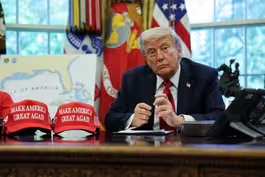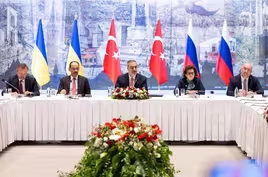
Brooks and Capehart on Trump's Middle East policy shifts
Clip: 5/16/2025 | 10m 41sVideo has Closed Captions
Brooks and Capehart on Trump's Middle East policy shifts
New York Times columnist David Brooks and Washington Post associate editor Jonathan Capehart join Amna Nawaz to discuss the week in politics, including President Trump's trip to the Middle East and his policy shifts in the region, Qatar’s luxury plane gift, the Supreme Court's birthright citizenship hearing, talks of an immigration reality show and the administration investigating James Comey.
Problems playing video? | Closed Captioning Feedback
Problems playing video? | Closed Captioning Feedback
Major corporate funding for the PBS News Hour is provided by BDO, BNSF, Consumer Cellular, American Cruise Lines, and Raymond James. Funding for the PBS NewsHour Weekend is provided by...

Brooks and Capehart on Trump's Middle East policy shifts
Clip: 5/16/2025 | 10m 41sVideo has Closed Captions
New York Times columnist David Brooks and Washington Post associate editor Jonathan Capehart join Amna Nawaz to discuss the week in politics, including President Trump's trip to the Middle East and his policy shifts in the region, Qatar’s luxury plane gift, the Supreme Court's birthright citizenship hearing, talks of an immigration reality show and the administration investigating James Comey.
Problems playing video? | Closed Captioning Feedback
How to Watch PBS News Hour
PBS News Hour is available to stream on pbs.org and the free PBS App, available on iPhone, Apple TV, Android TV, Android smartphones, Amazon Fire TV, Amazon Fire Tablet, Roku, Samsung Smart TV, and Vizio.
Providing Support for PBS.org
Learn Moreabout PBS online sponsorshipAMNA NAWAZ: For more on the president's trip to the Middle East and the week's political headlines back here at home, we turn now to the analysis of Brooks and Capehart.
That is New York Times columnist David Brooks, and Jonathan Capehart, associate editor for The Washington Post.
Great to see you both.
JONATHAN CAPEHART: Hey, Amna.
AMNA NAWAZ: Let's jump right in.
The president's first foreign trip to the Middle East, those three nations we talked about earlier, Saudi Arabia, Qatar and the United Arab Emirates, all places where the Trump family has deep business ties, and also a lot of headlines, David, right?
We saw some investment deal sign.
There was a meeting with the new Syrian leader, a man the U.S. has previously called a terrorist.
Iran nuclear talks continue.
What did you take away from that whole trip?
DAVID BROOKS: I thought there were two really big stories.
The first was the flip-flop on Iran.
If you -- people remember the Trump first term, he was the guy who walked away from the Iran nuclear deal that Barack Obama had signed, saying no deal.
And now he's back into the deal business.
And I happen to think this is the right move.
Iran is much weaker than they were even five years ago.
Israel has taken out Hamas and Hezbollah.
The Iranian economy is much weaker.
The Saudis, their rival, are much stronger.
And so they're much more inclined, I think, to do a deal than they were at any time in the last 15 years.
And so I'm glad Trump is exploring this.
I think it's the right move.
The second big thing I think on the speech - - on the trip was the Riyadh speech.
AMNA NAWAZ: Yes.
DAVID BROOKS: And that was a speech in which he defined his foreign policy.
And he basically -- all of American history, at least since postwar, is like, we care about democracy.
We don't like it if you're throwing people off roofs.
Like, we don't like it if you're murdering journalists.
Like, we don't like that stuff.
AMNA NAWAZ: Yes.
DAVID BROOKS: And that was partly realpolitik, the idea that tyrants are more likely to be expansionist and destabilizing, but also who we are as Americans.
Like, we do have a moral foreign policy.
And the two key pieces of the Trump speech were, we're not going to tell you how you run your country.
You want to blow off some journalists you don't like, that's your business.
And the second was we're not in the nation-building business anymore.
We're just staying out.
And that's a pretty sharp reversal of what had been 100 years of bipartisan foreign policy.
And we will see if it's right, whether we should be tolerant of dictators.
And we will see whether Americans can stomach it, because we define our national identity by how we see ourselves acting abroad.
And if we become amoralists, then that will shift how Americans think of their own country.
AMNA NAWAZ: Jonathan, what did you make of the trip?
JONATHAN CAPEHART: So, I look at the trip.
There's a -- I guess there was an old Western "The Good, the Bad, and the Ugly."
David talked about the good, the flip on Iran, talking to the new leader of Syria and ending the sanctions, give that new regime a leg up, the bad being what you were just talking about in terms of the president's speech.
And then there's the ugly.
You would be a stupid person if you didn't accept the free plane.
And the idea that the president of the United States is going to take a hand-me-down plane, a 13-year-old plane from a foreign country just on its face is horrendous.
And yet he's insisting on it.
And so even though he's done some, objectively speaking, good things on this trip, it has been overshadowed by the plane from Qatar, but also, to Laura's huge story... AMNA NAWAZ: Yes.
JONATHAN CAPEHART: ... interwoven in there is these deals that the Trump family is just mixed into completely.
AMNA NAWAZ: And we know we're going to continue to cover all of those stories as they unfold.
On immigration-related headlines this week, I know you both were tracking, of course, the Supreme Court was hearing arguments on birthright citizenship, which is an issue the Supreme Court unanimously affirmed over 125 years ago, Congress codified 100 years ago.
And then we end this week with the news that the Department of Homeland Security is considering backing a reality show in which immigrants compete for citizenship.
And I should note, our Laura Barron-Lopez spoke to the producer who said, it's not like we pit people against each other.
We're celebrating their journey.
It's people in the process, but someone has a chance to basically win getting to the front of the line.
Just the way that we're talking about who gets to be American right now, David, how are you looking at this?
DAVID BROOKS: Yes, a couple things.
First, we have birthright citizenship in this country.
We have had it, as you said, since the 14th Amendment at least.
AMNA NAWAZ: Yes.
DAVID BROOKS: The European countries, by and large, do not.
Asian countries, by and large, do not.
African countries, by and large, do not.
If you look at the countries around the world that have birthright citizenship, they tend to be in the Americas.
And that's because we saw ourselves as a certain kind of country, as a country that welcomed a lot of people, and a lot of people came here and then their kids were born here and we said, welcome, you are one of us.
And that, again, just like the foreign policy, is a longstanding tradition of America and its certain conception of what America was.
You go to non-birthright citizenship, which will not happen, by the way, because it's so unconstitutional -- it's not even a little unconstitutional.
It's major league unconstitutional.
And -- but you're looking at a European-style conservatism, not an American-style.
And, again, that's Trump really breaking with a lot of traditions here.
I was struck by Brett Kavanaugh asked the solicitor general on the Supreme Court, suppose a baby is born.
What's going to happen to that baby without birthright citizenship?
And the solicitor general said, I don't know.
We don't have a plan for that.
You think you would have a plan for that.
And then, finally, on the game show or whatever, the reality show, I have to confess, like, American -- I have never seen a reality show in my life, so... AMNA NAWAZ: You have never seen a single reality show in your life, David Brooks?
DAVID BROOKS: I have not seen "The Housewives of Bethesda, Maryland."
(LAUGHTER) DAVID BROOKS: I have not seen "Love Is Blind."
I did not see "Duck Dynasty."
JONATHAN CAPEHART: There's another one.
DAVID BROOKS: So it's just not - - I'm bad with emotional drama.
AMNA NAWAZ: OK. DAVID BROOKS: But if we're going to be in reality television land, I, frankly -- and this is counterintuitive.
I think it would be OK if Americans saw what immigrants are really like and that immigrants are not, like, rapists and gang members.
They are people who generally love this country and want a show that they are here.
And the guy who has allegedly conceived of the show was an immigrant.
It occurred to him during his naturalization ceremony.
And if Americans could see a naturalization ceremony, that alone would do a lot to improve how Americans think about immigration.
AMNA NAWAZ: Jonathan, what do you think?
JONATHAN CAPEHART: I have been to a naturalization ceremony, and it was one of the most beautiful things I have ever seen.
However, in the time that we're in -- and, to be clear, this producer proposed this during the tail end of the Obama administration.
This isn't something that's popped up just for the Trump administration, but you can't think about that television show without thinking about it in the context that we're living in, which is why I think a lot of people were thinking, wait, what, a Hunger Games for immigration?
Just because of how cruel the Trump administration has -- cruelly the Trump administration has treated immigrants, treated migrants.
I mean, I have watched reality television shows -- OK, well one, "RuPaul's Drag Race," which is a fabulous reality show.
JONATHAN CAPEHART: But I think that where we are right now, as wonderful as it would be for the American people to see immigrants who want to be in this country and do these competitions, I don't think, if this producer ends up having conversations with the DHS secretary in the Trump administration, what things they would want put into this show that would make it just demeaning.
And I just think, having read the interview that Laura did with the producer, it just strikes me that the guy has not read the room.
He doesn't, I think, fully appreciate why his idea has hit like a lead balloon.
AMNA NAWAZ: And we should note the homeland security spokesperson says it's in the early stages of vetting and the secretary herself has not seen it or signed off on it.
So we will continue to keep an eye on that.
Meanwhile, I have been dying to get both of your takes on this other story.
We reported earlier on the former FBI Director James Comey posting online this image: "Seashells arranged in 8647."
Of course, Donald Trump is the 47th president; 86 has become slang for getting rid of something, shorthand for a military phrase.
It can also mean to kill someone.
And Comey says he didn't realize it meant.
That's why he deleted the post and apologized.
There's still a federal investigation into this now.
David, what did you think when you saw this?
DAVID BROOKS: Well, I didn't know what 86 meant.
And so I only knew the kill, so I thought that was -- it's incredibly that it's a call to violence.
That was my first assumption.
I have now learned a lot more about diner slang.
(LAUGHTER) AMNA NAWAZ: OK. DAVID BROOKS: And, apparently, starting in the 1920s, when you were out of something, you wrote 86.
AMNA NAWAZ: That's right.
DAVID BROOKS: And I have learned that, if there was a pretty girl at the table, you wrote 89.
I knew none of this.
(LAUGHTER) JONATHAN CAPEHART: That, I did not know.
AMNA NAWAZ: Learning so much from David Brooks today.
DAVID BROOKS: And so I don't know Comey.
I know a little about him.
We have exchanged e-mails.
He's a very earnest, intellectual guy.
He's not an Instagram memester.
And so I assume that it would not have occurred to him to do violence.
I assume that his conception of 86 is from the diner or some other era, where it just means, we're out of this, let's get rid of this.
And so I assume he's not the first person, myself included, to have send really stupid texts.
And so, in retrospect, that was kind of stupid.
But I don't think he meant -- I would be shocked if there was evidence that he meant actual violence.
AMNA NAWAZ: Jonathan, what did you think of this?
JONATHAN CAPEHART: No, I mean, I agree with that.
I just thought it was boneheaded.
I mean, in our business, any time I put anything on social media, I mentally go through all sorts of permutations.
How will this be read?
What will people think in this photo?
What's in the photo?
All the things I do before I put something on social media.
The idea that the former FBI director didn't put all those numbers together and realize, hmm, maybe I shouldn't do that.
But then I have to also factor in one more thing.
James Comey does indeed have a book coming out on May 20, the same day as mine.
I'm not jealous.
JONATHAN CAPEHART: But what are we doing right now?
We're talking about James Comey.
AMNA NAWAZ: That's right.
JONATHAN CAPEHART: And so from selling a book perspective -- and, again, I don't know if this is why, this is part of some master plan to sell the book, but I just think the timing is very, very interesting.
AMNA NAWAZ: This is why I wanted to put the question to you, to get your takes, to learn about diner slang.
DAVID BROOKS: I'm following Jonathan's social media tonight, because I think there's going to be a counterattack.
AMNA NAWAZ: Tonight.
There's a reality show in your future too, David.
I can see it.
JONATHAN CAPEHART: Watch "RuPaul's Drag Race."
It's really fun.
AMNA NAWAZ: Jonathan Capehart, David Brooks, great to see you both.
Thank you so much.
JONATHAN CAPEHART: Thanks, Amna.
Gene editing treatment helps child born with rare disorder
Video has Closed Captions
Clip: 5/16/2025 | 6m 43s | Breakthrough gene editing treatment helps child born with rare disorder (6m 43s)
How the Trump family could be profiting off the presidency
Video has Closed Captions
Clip: 5/16/2025 | 9m 12s | Trump business deals revive questions about his family profiting off the presidency (9m 12s)
News Wrap: Israel strikes Houthi-controlled ports in Yemen
Video has Closed Captions
Clip: 5/16/2025 | 8m 38s | News Wrap: Israel strikes two Houthi-controlled ports and unleashes new barrage on Gaza (8m 38s)
Ocean Vuong explores chosen family and kindness in new novel
Video has Closed Captions
Clip: 5/16/2025 | 6m 54s | In 'The Emperor of Gladness,' Ocean Vuong explores chosen family and acts of kindness (6m 54s)
Russia-Ukraine talks fall flat with few signs of progress
Video has Closed Captions
Clip: 5/16/2025 | 8m 45s | Russia-Ukraine peace talks fall flat with few signs of progress (8m 45s)
Providing Support for PBS.org
Learn Moreabout PBS online sponsorshipSupport for PBS provided by:
Major corporate funding for the PBS News Hour is provided by BDO, BNSF, Consumer Cellular, American Cruise Lines, and Raymond James. Funding for the PBS NewsHour Weekend is provided by...
















